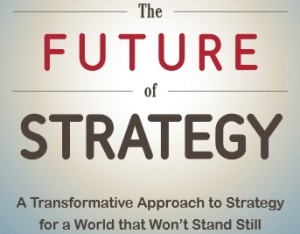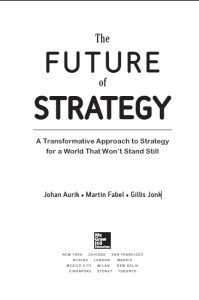Leaders today are inundated with strategic opportunities, besieged by business disruptions, and pressured to innovate—to do things better, faster, or differently. The CEO of a Fortune 500 firm explains it best: “I am looking at 23 different strategic initiatives. Trying to develop and implement so many strategies is like trying to change the driver, tires, oil, and bumpers; paint the body; and tune the engine. And doing all of this on a car that’s running at full speed.” The answer used to be found in strategy. But in the past decade, the commonly deployed large-scale strategic exercises were largely discredited. They were slow and elaborate and did not deliver the expected returns, let alone help make sense of a glut of initiatives or cope with an increasingly unpredictable future.
The Future of Strategy brings strategy back from those big top-down plans. It answers the questions of executives facing tumultuous business conditions and rapidly shifting markets: Is strategy still possible? Yes. Aren’t strategies outdated before they can be implemented? Not if they are done right. Rather than developing strategy, aren’t we better off being agile and able to capitalize on emerging trends faster than peers? Agility complements strategy; it cannot replace it. This book is about reversing course and repositioning strategy in its rightful place as the overarching management system.
The authors introduce their core methodology, designed to future proof companies against the friction and “the fog of war” that inexorably accompany changing times.
They synthesize three fundamental principles that, when combined, provide the means to reclaim strategy:
- Take direct cues from fundamental trends affecting the company going forward
- Engage people across the company to translate these cues into strategy and effectively eliminate the handover hurdle between formulation and execution, a major reason for strategy failure
- Capture the output as competitive opportunities and manage their life cycles—when some have run their course, others are ready to take over
Strategy today requires stepping over the shadows of one’s own ingrained beliefs to capture new opportunities. This book reveals the inner workings of transformational strategies developed by leaders who gradually become more successful by advancing winning combinations of attitudes, values, habits, and practices.
See more at: https://www.atkearney.com/books/the-future-of-strategy#sthash.cSuHKYKW.dpuf

